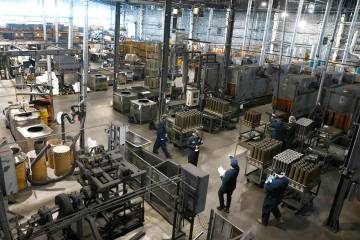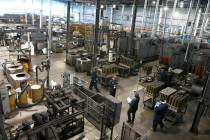California says Uber drivers are employees, not independent contractors
California’s labor commissioner said a driver who connects with customers through the Uber Technologies Inc. app must be considered an employee, a decision that strikes at the heart of its business model.
San Francisco-based Uber, like other “sharing economy” startups, has built a business around a flexible car fleet piloted by people it contends are independent contractors. If upheld, the decision might require the company to provide health insurance and guarantee a minimum wage — neither of which is required for contractors.
“We see this as a problem that’s growing larger with each year, with employees lacking security and even basic rights when they are treated as independent contractors,” said Steve Smith, spokesman for the California Labor Federation, which has backed tougher regulations on ridesharing companies.
Uber said in court papers it would appeal the decision. The resolution of the question in an economy that is the world’s seventh-largest may help define the future of Internet-enabled companies that depend on casual labor to provide car rides, shelter and even helicopter trips.
The company has scrapped with regulators from Houston to Berlin on issues from whether Uber is required to follow existing taxi laws to how it handles rider data and even whether Uber cars can pick riders up at airports.
Uber and its competitor, Lyft Inc., both face lawsuits questioning whether workers have legal protections of employees. While courts and regulatory agencies ponder, Uber has been expanding into hundreds of cities and raising money at a $50 billion valuation, meeting resistance from regulators and cabbies as it goes.
It’s not just startups that test the boundaries: FedEx Ground Package system agreed to pay out a $228 million settlement to 2,300 California drivers who said they were misclassified as independent contractors, according to a June 12 filing with the Securities and Exchange Commission.
Uber spokeswoman Kristin Carvell said in a prepared statement that the decision applied to a single driver and contradicted previous rulings.
“The number one reason drivers choose to use Uber is because they have complete flexibility and control,” she said. “The majority of them can and do choose to earn their living from multiple sources.”
The ruling, filed in San Francisco state court Tuesday, stemmed from a dispute with a former driver. Uber claimed the driver wasn’t entitled to claimed wages or expense reimbursement. The commissioner disagreed.
“The defendants hold themselves out as nothing more than a neutral technological platform, designed simply to enable drivers and passengers to transact the business of transportation,” the commissioner said in the decision, filed alongside Uber’s appeal notice. “The reality, however, is that defendants are involved in every aspect of the operation.”
The commissioner said the company dictates such things as how old a driver’s car can be and who is qualified to offer services through the Uber platform.
Federal judges in San Francisco had refused to throw out lawsuits raising similar claims against Uber and Lyft, saying the matter is best left to a jury to decide.
With urging from the taxi industry and labor unions, California lawmakers have been working to regulate ridesharing companies. Last year, lawmakers required drivers to carry at least $1 million in insurance for personal injury and property damage. The law, which was opposed by Uber, takes effect July 1.



























